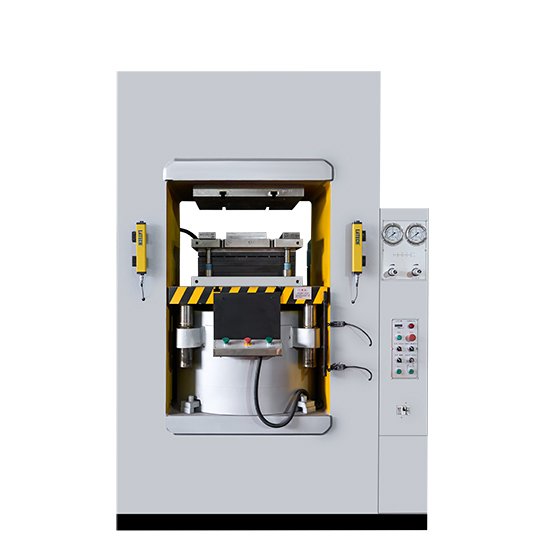Introduction
Hydraulics is a cornerstone of modern engineering, applying principles of fluid mechanics to power an array of machinery across industries, from construction equipment to aircraft systems. Within these hydraulic systems, we often find the hydraulic press, a powerful tool that utilizes Pascal's Principle to convert small amounts of mechanical force into large amounts of force. Crucial to the operation of these hydraulic systems is the working fluid, with oil being the predominant choice. This article delves deeper into the reasons behind the predominance of oil in hydraulic systems.



The Advantage of Using Oil in Hydraulic Presses
Oil possesses several characteristics that make it an excellent choice for hydraulic systems:
- High Lubrication Quality: The lubrication quality of a fluid is critical to the operation of hydraulic systems. Oil reduces friction between moving parts, prolonging their lifespan and improving the system's overall efficiency. Further, oil's viscosity, which is its resistance to flow, enhances this lubrication quality, unlike other fluids which can be too thin to offer the same protection.
- Better Resistance to Heat: Hydraulic systems often operate in high-temperature environments. Oil can withstand these high temperatures without reaching its boiling point or undergoing any significant changes to its properties. This resilience ensures a steady, reliable performance from the hydraulic system.
- Reduced Corrosion and Oxidation: Oil offers a superior level of protection against corrosion and oxidation. By forming a protective barrier over metal surfaces, it prevents harmful reactions with the environment that could degrade the system over time.
Possibility of Using Water Instead of Oil in Hydraulic Systems
Water has often been considered as an alternative to oil in hydraulic systems due to its widespread availability, lower cost, and less environmental impact. Despite these attractive attributes, water has several significant limitations that make it less suitable for use in hydraulic systems.
Why is Water Considered Detrimental for Hydraulics?
The properties of water present several challenges for its use in hydraulic systems:
- Water's Susceptibility to Freezing and Boiling: Water freezes at 0°C and boils at 100°C. These relatively low and high temperatures can limit the operation of a hydraulic system in extreme conditions. Conversely, oil retains its fluidic properties over a wider range of temperatures, making it more versatile.
- Corrosive Nature of Water: When water mixes with air, it can lead to oxidation and corrosion of metals commonly found in hydraulic systems. This process can degrade the components over time, leading to system failures.
- Inability to Lubricate as Effectively as Oil: Water lacks the necessary viscosity to serve as an effective lubricant in hydraulic systems. This could lead to increased wear and tear, reducing the system's overall lifespan.

The Differences in Results When Using Water or Oil in the Hydraulic Press
The fluid used in a hydraulic press has a substantial impact on the system's performance, maintenance requirements, and longevity:
- Effect on System Efficiency: With its superior lubrication quality, oil can lead to a more efficient system by reducing energy losses due to friction.
- Impact on System Longevity: Oil's resistance to oxidation and corrosion, combined with its superior lubrication, can result in a longer-lasting hydraulic system.
- Implications for Maintenance: Systems using water may require more frequent maintenance due to the corrosive effects of water and its lower lubrication quality.
Reasons Why Hydraulic Oil is Superior to Water
The choice between water and oil in hydraulic systems boils down to their inherent properties. Oil's enhanced lubrication, superior heat resistance, and resistance to corrosion and oxidation make it a clear winner:
- Enhanced Lubrication: The higher viscosity of oil, compared to water, results in better lubrication, reducing wear and tear and enhancing the system's lifespan.
- Increased Heat Resistance: Hydraulic oil can maintain its fluidic properties over a wider temperature range, ensuring consistent performance of the hydraulic system under varying operating conditions.
- Reduced Corrosion and Oxidation: By forming a protective layer on the components' surfaces, oil reduces the risk of corrosive and oxidative damage, preserving the system's integrity over time.
Factors that Make Hydraulic Systems Strong
Hydraulic systems offer considerable power and precise control, key factors that make them integral to many modern machines:
- High-Pressure Tolerance: Hydraulic systems are designed to handle high pressure, often reaching several thousand pounds per square inch (psi). This capability enables them to generate large forces from relatively small input forces.
- Efficiency in Power Transmission: By applying the principles of fluid dynamics, hydraulic systems can efficiently transmit power with minimal energy loss. The use of oil as the hydraulic fluid further enhances this efficiency.
- Responsive and Accurate Control: The design of hydraulic systems enables precise control of the output force, which is immediately responsive to changes in the input force. This responsiveness and accuracy are critical in many applications, from lifting heavy loads to precisely controlling aircraft surfaces.

Conclusion
In conclusion, the preference for oil in hydraulic systems is not arbitrary but a decision rooted in its superior properties compared to other fluids like water. Its superior lubrication, heat resistance, and ability to resist corrosion and oxidation are indispensable for the efficient and reliable functioning of hydraulic systems. While water's availability, cost-effectiveness, and environmentally friendly nature may be appealing, its limitations in practical application render it unsuitable for hydraulic systems. Thus, oil remains the fluid of choice, ensuring the strength, efficiency, and durability of hydraulic systems across various industries.



